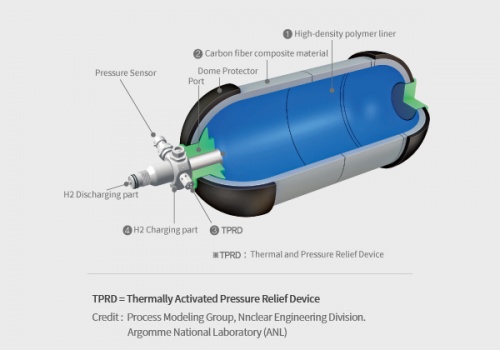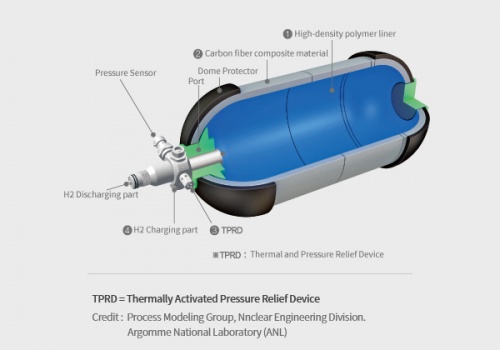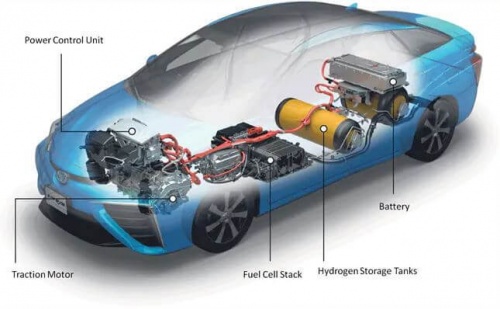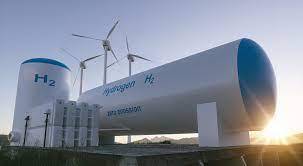Muhammad Alif Kurniawan
Contents
INTRODUCTION
Hello, nice to meet all of you and welcome to my page
My name is Muhammad Alif Kurniawan with NPM 2106732853
You can ask anything, lets going forward together
Definition of Hydrogen Tank
First of all, we will discuss a simple definition of a hydrogen tank, we can make a brief explanation about a hydrogen tank as follows :
A hydrogen tank is a specialized container designed to store hydrogen gas, either under high pressure or as a cryogenic liquid, for various applications such as fuel cell vehicles, power generation, and industrial processes. The tank's primary function is to safely store hydrogen until it is needed and then release it for use in the desired application. It is constructed using high-strength materials to withstand the pressure or low-temperature conditions required for hydrogen storage. The tank may incorporate safety features, insulation (in the case of cryogenic tanks), and fittings or valves for filling and dispensing hydrogen.
After that, based on the assignment given on May 22, 2023. Every students are assigned to make an optimal design design for a hydrogen tank, for for the specifications that are used as constant variables in the production of hydrogen tanks can be seen below :
1. Has a capacity of 1 Liter
2. Operates at a pressure of 8 bar
3. Have a maximum production price of Rp. 500,000
Functionality of hydrogen Tank
Hydrogen tanks have been used in various ways, be it in everyday life or for other purposes, be it small scale to industrial scale. Here are the three main functionalities of a hydrogen tank:
A. Storage and Transport
The main function of a hydrogen tank is to store and transport hydrogen gas safely. These tanks allow for the storage of significant amounts of hydrogen for use in applications such as fuel cell vehicles, power generation and industrial processes. By storing a sufficient amount of hydrogen, tanks allow efficient transportation from one location to another, allowing access to renewable energy sources in certain places.
B. Clean Energy Source
Hydrogen is a clean energy source and can be used to reduce greenhouse gas emissions and air pollution. By using a hydrogen tank, energy stored in the form of hydrogen can be released and used to generate electricity via fuel cells, drive fuel cell vehicles, or meet industrial energy needs. Hydrogen tanks play an important role in providing access to an environmentally friendly and sustainable source of energy.
C. Integration with Energy Infrastructure
Hydrogen tanks also work within the integration of a wider energy infrastructure. They can be connected to a hydrogen dispensing system which enables efficient refueling of fuel cell vehicles. In addition, hydrogen tanks can be integrated with existing energy storage networks and natural gas networks to provide energy reserves, offset fluctuations in supply and demand, and strengthen the stability of the energy system.
All in all, hydrogen tanks play an important role in storing, transporting and using hydrogen as a source of clean energy. They enable broader and more efficient access to hydrogen, assist in reducing emissions and support the transition to a low-carbon economy.
Advantages & Disadvantages of Hydrogen Tank
The use of hydrogen tanks as a fuel storage method certainly has some advantages and disadvantages. Here are some factors that can be considered in the hydrogen tank production process :
ADVANTAGES
1. Energy Sustainability
Hydrogen tanks allow for sustainable energy storage. Hydrogen can be produced from renewable energy sources, such as solar or wind power, through the electrolysis of water. By storing the generated energy in the form of hydrogen, the tank allows long-term storage and use of renewable energy when needed. This helps overcome the challenges of fluctuating energy supply and demand and enables the wider use of renewable energy.
2. High Energy Capacity
Hydrogen tanks have a very high energy capacity compared to conventional batteries. Relatively lighter in weight, a hydrogen tank can store more energy than a battery of the same capacity. This allows fuel cell vehicles to have a wider range and faster refueling times. In addition, the high energy capacity of hydrogen tanks also allows energy storage and use on a larger industrial scale.
3. Fast Charging Time
Filling a hydrogen tank can be done in a relatively short time. Compared to charging an electric battery which requires a longer time, filling a hydrogen tank can be comparable to filling a conventional fuel. This allows the use of fuel cell vehicles that are more comfortable and similar to fossil fuel vehicles. This fast charging time also contributes to efficiency and convenience in the use of hydrogen energy.
With energy sustainability, high energy capacity and fast filling times, hydrogen tanks are an attractive solution for energy storage and the use of hydrogen as a clean fuel. These advantages are helping to drive the adoption of hydrogen as a promising alternative in the transition to a more sustainable energy system.



